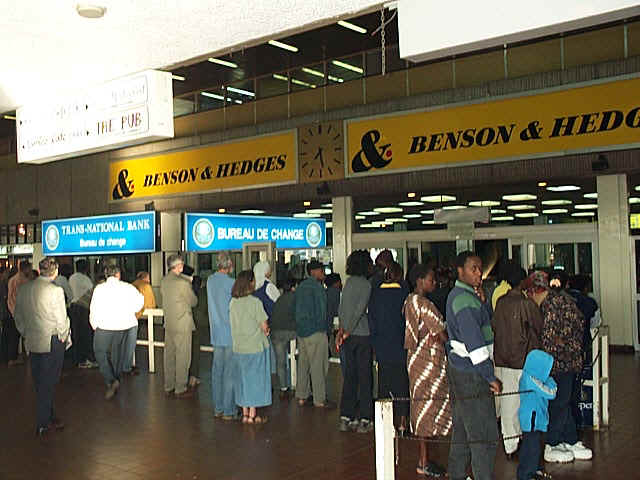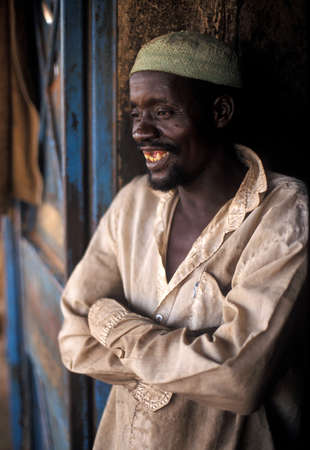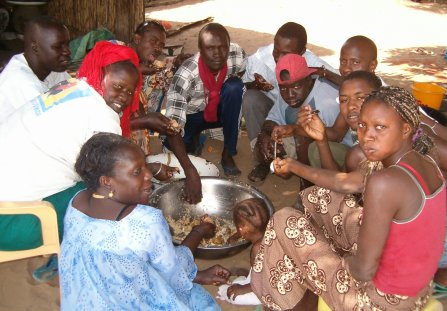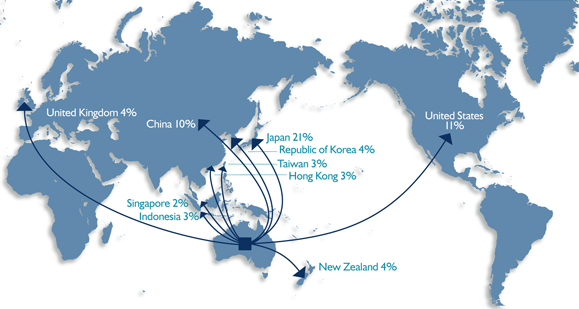The views expressed on this blog are my own and do not necessarily reflect the views of Oracle.

If you consider doing business in Africa you have to ask yourselves the question:
Do we really want to do business in Africa?
If the answer is yes, you should approach the opportunity just like you would approach any investment decision anywhere else on the planet and prepare yourselves accordingly.
A cost-benefit analysis can give you a go or no-go, based on what you feel is an acceptable level of return on the investment you are willing to make, considering possible alternatives.
Recent studies have identified that some projects in Africa yield up to four times the returns these projects would yield in Europe and twice as much as they would yield in Asia.

When the opportunity is there and the understood risk is high, the measures that should be put in place to manage the associated risk, should be properly defined.
The initial cost of identifying exploitable oil fields are significant but the returns of the production side of the business are hugh as well, if the studies turn out correct.
Needless to say what the impact can be of mistakes….

Some companies make half-hearted decisions when it comes to running their operations in Africa and may end up getting disappointed after a while because they are caught by surprise on various fronts from productivity and efficiencies to facing infrastructural issues nobody had even thought of as potential challenges.
A recent CNBC broadcast titled “Dollars and Danger” had the intention to portray Africa as the final investment frontier.
The first 3 minutes of the program give an example of a Chinese project in Libya where China is accused to export their labor problems to Africa running more Africans into unemployment.
I think it is well understood by now that the US and China are both competing for African energy resources and one can read this between the lines here again.
Not to mention that the US is slowly losing its first trading position with Africa and of course this is not something that the US is happy with.
Most people in the US still believe that the investment and official donor assistance their country provide to Africa are among the highest in the world. Facts have proven the contrary.
The next 4 minutes discuss the risks and dangers of doing business in Africa, where one could end up believing that you cannot walk the streets of Africa without at least one bodyguard because of the way that one conflict zone, limited to a small region of one country, is blown up to a level as if this is the standard across the continent. The reality is that the number of wars and conflicts at this point in African history are lower than ever before and lower than in Asia for instance.
I am not sure how many potential investors made it all the way to the end of the program. If there still were people watching I wonder how many of those ended up seriously considering Africa as an investment opportunity.
It is sad that this has become the standard of portraying a continent that has never been given a fair chance for as long as the developed world has been interacting with it.
I will share some of the considerations I made, with you, when I started to work in Africa that have helped me to exceed my expectations.

The first thing one need to realize is that Africa is a continent that consists of 54 countries and I am showing you a picture that will help you understand the size of the continent to put things in perspective.
You can read more on this topic in my post of https://dfafie.wordpress.com/2008/11/30/balance-the-view-and-opinion-on-africa/
Arabic, English, French, Portuguese and Spanish are the imported languages depending on what part of Africa you are at, apart from the thousands of local languages that are spoken by the African people.
Unless the nature of your business is linked to available natural resources, you need to decide on a location or multiple ones where you want to operate from.
Here you will have to strike a balance between business opportunities and cost of operation given that the level of available infrastructure differ from one country to another.

If the nature of your business requires mobility for instance you have a limited number of airports that will allow you to reasonably connect across a region. You may not have the business volume in the country from where you operate but you have the convenience of a workable infrastructure. The safest bet therefore in this case, is to consider offices to play a regional function rather than a local one, right from the start. You can read more on this topic in my earlier post: Africa is big and flights are short in supply at https://dfafie.wordpress.com/2008/12/19/africa-is-big-and-flights-are-in-short-supply/

Companies that require skilled labor will have to make a decision to bring in the skills from overseas or to invest in local staff or a combination of these. When skills are a determining factor you also need to consider where you want to train your staff, on-site or overseas.
If you have to sent staff overseas for training you may face challenges obtaining visas for your staff based on where staff originate from unfortunately. This is one of the so many imposed barriers to Africa’s development by the developed world, but one that should not be underestimated. Sometimes visa requests are rejected without even a plausible reason.
A more local consideration is that it can be more difficult in some African countries to obtain work- and residency permits for neighboring nationals because the hosting country wants to protect employment for their local citizens.
See my post on visa related issues at https://dfafie.wordpress.com/2009/05/

Some companies work with or via local partners. My recommendation is to look for business partners on equal footing so that the partners can organize themselves similar to meet each other’s expectations in terms of investments, organizational structures and quantitative and qualitative standards.
If you are new to a region, working with a local partner can help you to get the local know how faster incorporated into your company.
The good news for Africa is that more nations have started to invest in Africa. While historically the Europeans were the main overseas players, today US, Chinese and Middle Eastern companies are present and compete for the business opportunities.
I see different approaches to doing business from some of the companies depending on where they originate from.
Knowledge transfer is a common practice for US based companies for instance, where the Chinese companies bring in most, if not all the work force from China thus providing less long-term benefits to the local population.
Not all companies will work with local staff at all levels of the organization and some even have different levels of employee standards for staff that come from overseas versus local staff.
This creates all sorts of human resource problems in the long run. This is not a specific problem in doing business in Africa.
There are plenty examples of companies applying duality everywhere in the world.
The average age of Africa’s population ranks very young and with proper training, skills can be developed. While doing business, we have a great opportunity to invest in Africa’s future at the same time. If there is one way we can make a difference in assisting the development process from within the private sector, it definitely is in the area of capacity building.
The size of a company will determine to some extend the possible investments that can be made. It is the initial cost of exploration that will represent more of a challenge to smaller companies than it will to larger ones. Given the many additional factors companies have to consider when doing business in Africa, it is a conditio sine qua non to have a chance for success. If your company does not have the means to do proper due diligence, you may be better off exploring easier terrain.
There are some conditions that we have to accept for the time being since in most cases companies can do little or nothing about these.
Some countries still have state owned utility companies that hold a monopoly position providing poor service while overcharging the consumer, to mention just one.
Similarly there are government owned cooperations for some of the natural resource related economic activities, that impose price and conditions to the producers. Cotton and cacao are good examples where the farmers work very much under cooperation’s set rules. Since these cooperations are most of the time the only one in its kind in the country, providing fertilizers, pesticides and some other basics to the farmers who have no access to capital, it is difficult to change the conditions for some of these primary producers. Even with micro financing support, the farmers would still be stuck with price cartels once they want to sell their crop.
It is difficult to break this model as long as these monopolies exist.
If you are part of such a chain the basic conditions will be very much set for you when you approach your suppliers.
If you work regionally and you have to transport goods by trucks, crossing borders requires a skill all by itself, to ensure that your cargo does not lose time dealing with the formalities.
Specially perishable goods require close attention and working with solid partners will proof useful in most cases.
The public opinion on Africa is based on what the media cares to show and more often than not this is a very negative single sided reflection of the reality.
When there is a conflict in one part of one country the news headlines will state that there is a problem in Africa and thus the issue gets amplified by a factor of 54!

In all the years that I have lived and worked in Africa I have always applied a simple rule. If you are in Rome do as the Romans do! So if you are in an unfamiliar place, you should pay attention to good advice from your local staff or local partner and you should not go experiment on your own. I have never used bodyguards nor any security personnel and I have worked in over 34 countries in Africa for years and I am enjoying my work and my life. I have come to terms with the fact that sometimes there are power cuts, water cuts and other inconveniences but the flip side is that if you do, you can enjoy a very hospitable environment where nobody ever complains even if they have all the reason to do so at times.

If you are in London, people will complain about the rain or the sun. It is either too wet or too hot but it is never going to be fine..

You run into any person anywhere in the streets of Africa and you ask them how they are and they will tell you , I am fine and will do so with a sincere smile.
Of course there are issues. It would be naive to think that there wouldn’t be any issues across 54 countries. More so if we realize that there are so many issues with the rest of the world.
Somehow we have become myopic and we only manage to see what does not work in Africa, while we are stuck up to our eyebrows with issues in the developed world.
Did Africa create the economic crisis most of the western countries are currently struggling with just to pick on a recent one ? When these problems, that the western world created itself, happen, overnight billions of dollars can be found to fix the problems and everybody turns back to autopilot.
Those of us who are successfully working in Africa often ask ourselves the question how come “those back home” fail to see what it is that we see…
I have come to the conclusion that often the problems come from a pre-conditioned mindset that forgot to do due diligence before taking up the new challenge, irrespective of the location of the activity.
For you to proof me wrong!
© Desi Lopez Fafié




















Recent Comments